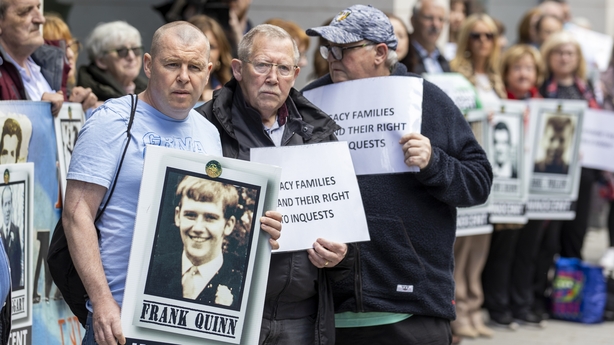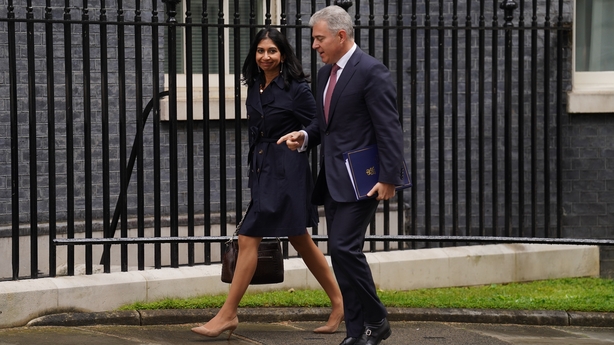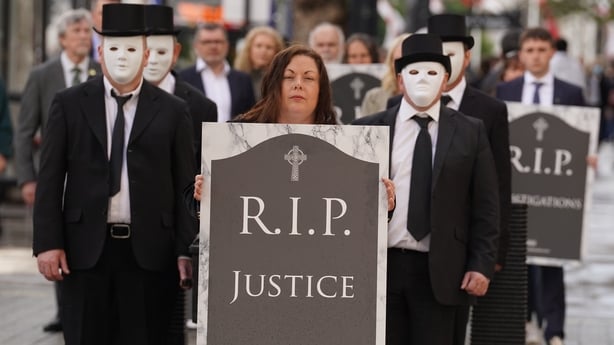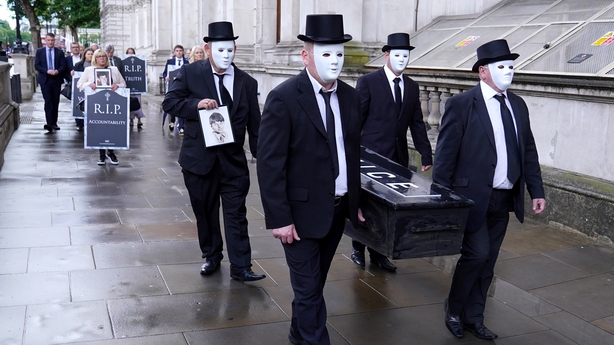Two separate groups of protesters gathered today to oppose the UK Government's introduction of controversial legacy legislation.
The Northern Ireland Troubles (Legacy and Reconciliation) Bill cleared its first British House of Commons hurdle without support from any of Northern Ireland's MPs.
MPs voted to give it a second reading by 285 votes to 208, majority 77, which means the principle of the legislation has been approved.
Three more stages are due before the Bill can be voted into law.
DUP leader Jeffrey Donaldson asked UK Northern Ireland minister Conor Burns if the government would take heed of the voices of Northern Irish MPs during the committee stage of the Bill if there is "cross-party support" on key changes.
Mr Burns replied if agreement could be reached on ways to improve the proposals then they would "absolutely" look at them.
The draft legislation offers immunity to those deemed to have co-operated with a new Independent Commission for Reconciliation and Information Recovery.
The Bill would also stop future inquests and civil actions related to the Troubles, although it does not fully close the door to criminal prosecutions.
The proposed legislation has been widely criticised by Northern Ireland's political parties, as well as victims' campaigners, the Irish Government and Amnesty International.
Around 100 demonstrators gathered outside the Northern Ireland Office headquarters in the centre of Belfast in opposition to the controversial legacy legislation.
The protest featured a number of relatives from families who lost members during the Troubles.
Many of the protesters carried photographs of their lost relatives and placards opposing any amnesty for Troubles crimes.
Mark Kelly, whose 12-year-old sister Carol Ann was killed by the British Army in 1981, said the Bill would "deny all families who had loved ones killed truth, justice and accountability, irrelevant of who the perpetrators were".
"It will close down investigations, inquests, police ombudsman inquiries and civil cases," he said.

In London, the Relatives for Justice group delivered a letter to 10 Downing Street setting out its opposition to the Bill.
Mark Thompson, chief executive of the organisation, said British Prime Minister Boris Johnson "needs to listen" to relatives.
He said the Bill is about the UK "putting a blanket ban on any examination of what they've been involved in". He said he wants to bring an awareness to MPs of "just how dreadful this Bill is".
Mr Thomson added: "This process the UK propose will not provide a modicum of truth for anyone."
He said the Bill is "perpetrator centred" and "anti-victim", adding: "The beneficiaries of this are the people who pulled the triggers and planted the bombs."
Raymond McCord of The Truth And Justice Movement - whose son was killed by loyalists - said the only people who benefit from the proposed legacy legislation are the murderers and terrorists.
"The losers all round are the victims and their families," he told the PA news agency.
He said Mr Johnson, Northern Ireland Secretary Brandon Lewis and many other MPs treat families of Troubles victims as "daft Paddies".
Mr McCord said: "If they were at school and they were doing an O-level for Northern Ireland they would all fail. It's as simple as that."
Northern Ireland Secretary Brandon Lewis told the UK House of Commons that successive governments have not been able to resolve the legacy of the Troubles owing to its sensitivity and complexity.

He went on: "The current system is broken. It is delivering neither justice nor information to the vast majority of families.
"Faith in the criminal justice model to deal with legacy cases has been undermined. We need to be honest about the limitations of focusing on criminal justice as a means to secure truth and accountability".
Mr Lewis said he accepted the legislation will remain "challenging for some", adding: "I want to say directly to all those individuals and their families - I respect, we as a government respect, the personal tragedies that drive their determination to seek the truth and accountability for the losses they have suffered."
In an emotional intervention, DUP MP Jim Shannon (Strangford) appeared to hold back tears as he described the "murders" of his cousin and others at the hands of the IRA, and the subsequent lack of accountability.
He described his "angst and agony" for his constituents, and said: "I want to have the justice that they have been denied for over 50 years."
He asked what the Secretary of State was doing to ensure that happens.
Mr Lewis said what the legislation wanted to achieve is "an outcome that means that people get the truth, and with that does come accountability".
He encouraged the Irish government to bring forward its own legislation to aid the reconciliation process as he acknowledged "uncomfortable" information for the British government is expected to be released via its process.
He said people will be required to acknowledge their involvement in serious Troubles-related incidents and reveal what they know in order to gain immunity.
Mr Lewis added: "These provisions will also apply to individuals who have previously been provided with so-called on-the-run letters, letters of comfort.
"I want to be crystal clear that these letters have absolutely no legal standing and cannot be used to prevent prosecution under this new approach."

Shadow Northern Ireland secretary, Labour MP Peter Kyle, said: "The test for a way forward is that it must provide more benefit for victims than those who committed acts of terror. In so doing, it would also offer greater fairness to our armed forces and veterans."
He went on: "Delivering a Bill which provides more benefit to terrorists than veterans or victims is not fair to anyone."
Julian Smith, a Conservative former Northern Ireland secretary, urged the UK government to "look again" at proposals that would prevent inquests and civil actions related to the Troubles.
He raised concerns that a new independent commission for information recovery will not meet the requirements of Article 2 of the European Court of Human Rights.
Mr Smith warned: "If these fears are right the Bill risks leading to ongoing legal challenge and a highly unstable environment for victims."
He added: "Today many victims feel that they have been hit by a double whammy with this Bill. Their route to justice cut off, and at the same time their route to the truth restricted."
Mr Smith said the Bill "overrides both the policy of Stormont House, but also the focus on consent present in that international agreement".

'This Bill drives a coach and horses through the pursuit of justice'
Belfast East DUP MP Gavin Robinson told MPs: "I know there are members in this Chamber that think 'for goodness sake Northern Ireland legacy, can't they just agree?'
"Well, we all do agree in Northern Ireland that this Bill is wrong, that this Bill will not command support, that this Bill drives a coach and horses through the pursuit of justice. And I take no pride in that."
Fellow DUP MP Ian Paisley (North Antrim) said it was "perverse" to identify war crimes elsewhere while making an "attempt to conceal and forget those very war crimes" in the UK.
He said changes to the Bill are necessary, warned it may "undermine the rule of law" and that it "failed the Northern Ireland test of getting any sense of consensus whatsoever".
He added: "If anyone in this House honestly thinks that somehow terrorists are going to walk into a review process and fess up to all the bad things they did, and it will all be forgotten, they're absolutely wrong.
"This is not about reconciliation. It is wrong to call this reconciliation, because it will not reconcile those differences, it will actually drive a stake further between them."
SDLP leader Colum Eastwood (Foyle) said: "The pretence from this government that this is about victims or reconciliation is frankly an out-and-out lie."
He added: "There's absolutely nothing in this Bill for the victims and those people who've been left behind by all those perpetrators who destroyed lives and families over many years.
"The British Government is no neutral observer in what happened here, it cannot be allowed to make the decisions on behalf of the people of Northern Ireland."
Imposing the Troubles legacy proposals on Northern Ireland would be an "act of institutional hostility" as well as "unwanted and unworkable", according to SDLP MP Claire Hanna (Belfast South).
While Alliance Party deputy leader Stephen Farry said the Bill would prove to be "utterly unworkable".
He also told MPs: "Legacy is by far the most sensitive issue in our political space.
"Indeed, there's a real prospect that what is happening with this legislation, including the manner in which it has been handled, is going to end up re-traumatising victims".

